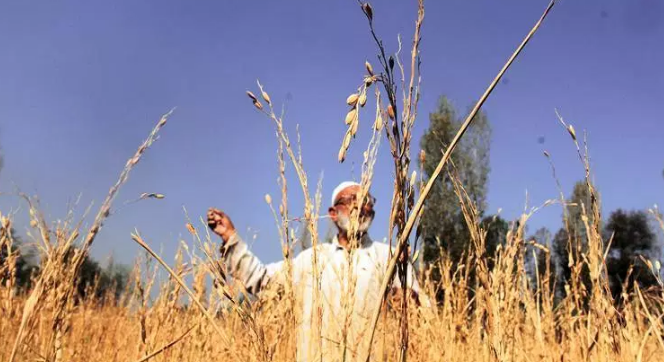How Amended Land Laws Undo Historic Reforms in J&K

Image Courtesy: The Indian Express
On 26 October, the Union Ministry of Home Affairs issued two orders: the Union Territory of Jammu and Kashmir Reorganisation (Adaptation of Central Laws) Third Order, 2020 and the Union Territory of Jammu and Kashmir Reorganisation (Adaptation of State Laws) Fifth Order, 2020.
While the Third Order adapts central laws such as the Real Estate Act, the Fifth Order has brought sweeping changes to land laws in the former state of Jammu and Kashmir by repealing 12 state laws, including the historic land reform laws, and amending several others, some of which dealt with the sale and purchase of land in Jammu and Kashmir.
The amendments officially end the protections on land rights guaranteed under Article 35A, repealed on 5 August 2019. It must be remembered that Jammu and Kashmir was one of the few states in India, along with Kerala, West Bengal and Tripura, to have undergone land reforms that redistributed land to the tiller and abolished the feudal jagirdari system.
With the Ministry of Home Affairs’ recent orders, the constitutional safeguard provided to protect the distinctive interests and identity of the people of Jammu and Kashmir with respect to land rights has been done away with. The orders now allow the purchase of land by those who are not permanent residents of the Union Territory. The term “permanent resident” has henceforth been removed from all statutes. This has undone the rights provided to the territory’s peasantry and permanent residents over several decades.
Undoing the rights of peasantry and permanent residents
Owing to the special historical circumstances, Jammu and Kashmir had several constitutional provisions to safeguard the distinctive rights and identity of the region’s permanent and local residents. Some of the major land laws that established rights of peasantry and preserved land in the hands of permanent residents were: the Jammu and Kashmir Alienation of Land Act, 1938, the Jammu and Kashmir Big Landed Estates Abolition Act, 1950, the Jammu and Kashmir Common Lands (Regulation) Act, 1956, the Jammu and Kashmir Land Grants Act, 1960, and the Jammu and Kashmir Agrarian Reforms Act, 1976.
The aim of the Jammu and Kashmir Alienation of Land Act, 1938 was to consolidate laws relating to transfer of agricultural land in the state. The Big Landed Estates Abolition Act, 1950 provided for abolition of large estates and their transfer to actual tillers. Under this Act, the optimum unit of land that a landlord can retain was fixed at 182 kanals (22.75 acres). It was a truly historic piece of legislation in the sense that it led to confiscation of excess land and its redistribution among those who worked on it.
Similarly, public rights to commons were established under the Jammu and Kashmir Common Lands (Regulation) Act, 1956. It also gave local landowners a say in how village commons would be used. The Jammu and Kashmir Agrarian Reforms Act of 1976 provided transfer of land in ownership rights to tillers and ceiling on land was further reduced to 100 kanals (12.5 acres) and absentee landlordism was abolished altogether.
While the MHA’s Fifth Order has completely repealed the three laws: the Jammu and Kashmir Alienation of Land Act, 1938, the Jammu and Kashmir Big Landed Estates Abolition Act, 1950, and the Jammu and Kashmir Common Lands (Regulation) Act, 1956, the “permanent resident” clause has been omitted from sections regulating the lease and transfer of land from the Jammu and Kashmir Land Grants Act, 1960, and the Jammu and Kashmir Agrarian Reforms Act, 1976.
Second, sweeping changes have been made in the Jammu and Kashmir Land Revenue Act, 1996 with regard to agricultural land. Agricultural land is still not for sale to people outside the state, but the new amendment has eased laws governing land transfers and restrictions on changing land use.
The amended land revenue act prohibits the sale of agricultural land to a non-agriculturist, yet authorises the government or an officer appointed by it to “grant permission to an agriculturist to alienate the land to a non-agriculturist by way of sale, gift, exchange or mortgage or for such agreement on such conditions as may be prescribed”. The non-agriculturist does not need a local domicile certificate to buy the land. It also says that the government may formulate procedures and conditions for leasing in or leasing out of agricultural land for agriculture and allied activities.
The amendments introduce a mechanism for the government to enable transfers of agricultural land for various non-agricultural purposes, namely public trust for charitable purposes, industrial, commercial or housing purposes, or to promote healthcare and education (p. 99-100). Agricultural land may also be transferred by a person or government to a landless person or a village artisan, or for “public purpose” to “any government”, company, corporation or board defined in the Companies Act of 2013.
The amendments shift the power of approving the change of land use and utilisation of village commons from elected representative (revenue minister of the state government) to district collector.
Pushing private investment
The Third and Fifth Orders are evidently aimed at opening up the Union Territory of Jammu and Kashmir, its agricultural land, and to push private investment and industry: indicators of this tendency are the “development zones” exempt from all earlier land laws (which require permission to change land use), the easing of land acquisition under the central law and extension of central real estate laws without the permanent residency clause, the easing of laws governing agricultural land transfers to non-residents and for various non-agricultural purposes, and the proposal to create the Jammu and Kashmir Industrial Development Corporation.
In addition there is a push for contract farming with the amendments in the Jammu and Kashmir Agrarian Reforms Act, 1976. Earlier, people vested with ownership rights under this Act could only transfer land to the government of Jammu and Kashmir. This has been broadened to the “government, or its agencies and instrumentalities”. Besides, ownership of such land could only be transferred as a mortgage for loans—now it can be transferred for mortgages as well as contract farming and leases.
Demographic change: long term agenda
The MHA’s orders, which make sweeping changes to land laws in Jammu and Kashmir, should be seen in line with the current regime’s political agenda and actions to make qualitative and quantitative changes in the territory and divest local residents of their rights. These amendments are a logical corollary to the abrogation of the special status of Jammu and Kashmir by the central government in a questionable manner last August.
These amendments intend to revoke the rights of the peasantry and permanent residents, which had been established through historic land reform legislations. They aim to open up agricultural land and push private investment in the region. What should also not be missed is that these amendments, when seen with the abrogation of the special status, pave the way for a demographic change in the long term.
The author is an independent researcher based in New Delhi. The views are personal.
Get the latest reports & analysis with people's perspective on Protests, movements & deep analytical videos, discussions of the current affairs in your Telegram app. Subscribe to NewsClick's Telegram channel & get Real-Time updates on stories, as they get published on our website.
























